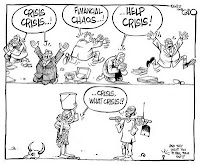ON NEGOTIATING STYLES:
Are you the shark or are you the fox?
Have you let down you inner box?
There is one party, and one party alone,
That can vindicate your lonely soul.
Step in, step out.
And let there be no doubt.
That in agreement we find ourselves,
But in discord there is nothing else.
A man whose job was to negotiate the price of fate,
And who had spread love without debate,
Was found dead.
Castrated.
300 AD but possibly undated.
Reach agreement! Or else perish alive,
Not to negotiate is to take a long, lonely, dive,
“Believe me!” a tough man says, “this is my last offer”,
But the only tough negotiator is La Mort,
And there cannot be anything tougher.
Magic wounds, early concessions,
Not to make any is a hard learned lesson,
But in the world of business,
Just like in the world of love,
Not to give in,
Is a price above.
Step in, step out.
And let there be no doubt,
That it is together that the wound magically heals.
That I will never,
Negotiate,
The way for you I feel.






